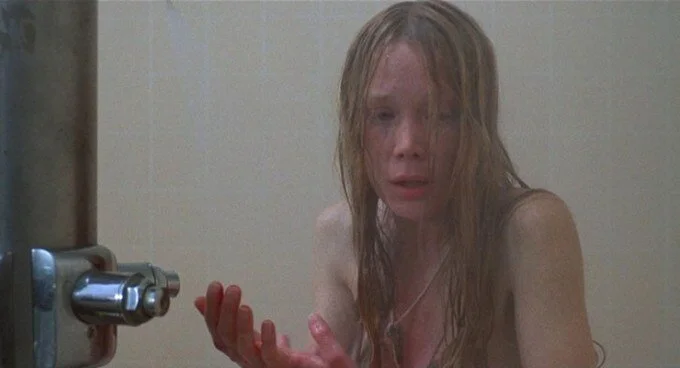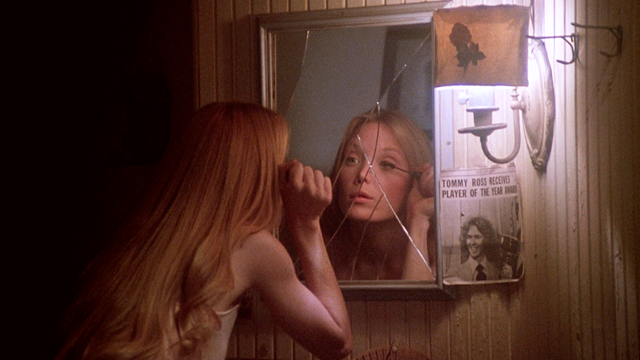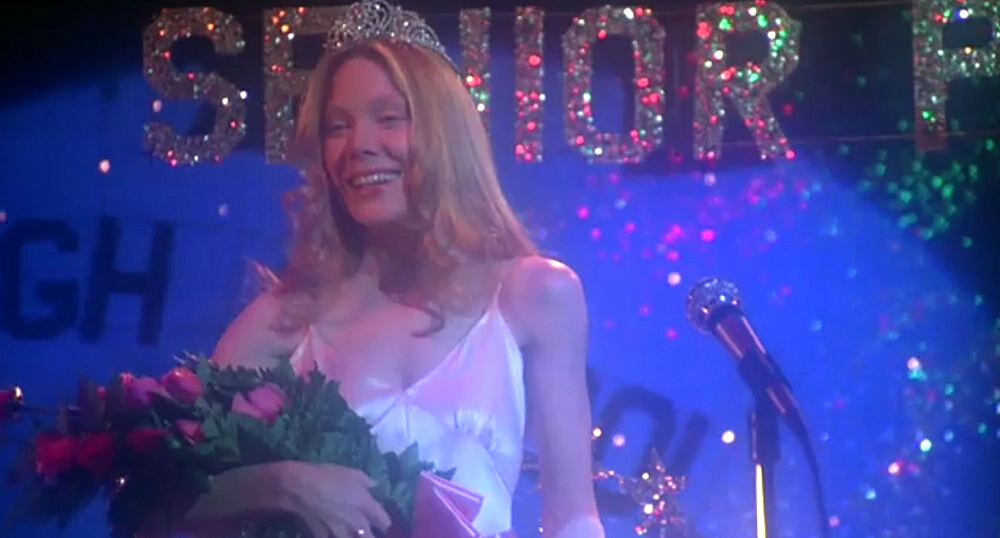[Film Review] Carrie (1976)
On top of being one of the scariest movies of all time, Brian De Palma's 1976 film Carrie is also one of the saddest. Put simply, Carrie is a story about what loneliness can do to a person. And it's also a story about how women find their power, sometimes in the most unusual ways.
Carrie is based on Stephen King's novel of the same name, and Sissy Spacek stars as its troubled protagonist, with Piper Laurie delivering an unforgettably creepy performance as her deranged mother. Laurie's extreme facial expressions and theatrical body language throughout the movie are responsible for some of its most terrifying moments.
The opening of Carrie is almost laughable in its overtly male gaze: Carrie White and her classmates are in various stages of undress in their locker room, bathed in a gentle light. While peacefully showering, Carrie begins her first period. It's especially horrifying for her because her uber-religious mother has not given her a proper heads up. And since Carrie is a social pariah, she's not getting any menstruation information from her classmates.
Screaming, she runs towards the other girls, her bloody hands reaching out for help, empathy and understanding. In the movie's first true moment of horror, the other girls chant, "Plug it up, plug it up!" as they pelt Carrie with pads and tampons until she's backed into the corner and slides down the bathroom wall in a familiar gesture of hopelessness.
As Carrie's overwrought emotions cause an overhead lightbulb to burst, we see the first hint of her telekinetic abilities. She's sent home, but not before overturning the ashtray of the principal, who calls her by the wrong name not once, not twice, not thrice, but four times. It's impossible not to give a little cheer every time Carrie gets a little revenge on the people around her who treat her with contempt at worst and at best, total indifference.
After Carrie's mother returns home (accompanied by foreboding music and a shot of Carrie sadly peeping out her top window), she tells her daughter, "You're a woman now." Carrie asks, "Why didn't you tell me, Mama?" Mrs. White knocks her daughter to the floor and says, "Don't you know I can see inside you?" It's not bad enough that Carrie is a lonely teenage girl trying to deal with her changing body; now her mother is telling her she has no privacy, nothing is sacred and thatsshe knows her daughter inside and out.
Mrs. White throws Carrie into a prayer closet (quite literally a closet where they go to pray) full of religious items, including a particularly scary Jesus with arrows through his body and menacingly lit-up eyes. After Carrie is let out, she stares at herself in her bedroom mirror, with yet another Jesus reflected behind her. She mentally shatters the mirror, symbolically gaining back ownership over herself and her own reflection.
Soon after the locker room horror show, two of the girls who were present use their boyfriends to alternately make amends to Carrie and punish her further. Sue, remorseful about her bullying behavior, convinces her angelic boyfriend Tommy to take Carrie to the prom -- but at the same time, Chris, the leader of the mean girls, persuades her boyfriend Billy to pull a vicious prank on Carrie during the prom.
Watching Sissy Spacek's wide-eyed and tender performance of Carrie, it's impossible not to feel an ache for the young woman who was mistreated by almost everyone. The sense of innocence and loneliness she brings to the role makes her sympathetic throughout. Before she attends the prom, she eagerly tries on makeup in the drugstore, and she is very much alone with her reflection once again. Watching her prepare for a night that we know will end very badly is heartbreaking.
Back at home, she applies mascara in the mirror she herself cracked with Jesus once again looming in the background. Mrs. White informs her daughter, "I can see your dirty pillows; everyone will." The camera zooms in on her breasts in another moment of the male gaze – or is it? Carrie takes back the power as she calmly educates her mother: "Breasts, Mama. They're called breasts. And every woman has them." Carrie is feeling confident; she's feeling like a "normal" teenage girl about to go out with a cute boy.
Her daughter's self-possession causes Mrs. White to become even more agitated; she starts pulling her own hair and shrieking at Carrie, "They're all gonna laugh at you." Carrie takes back the power in this moment and neatly tosses her mother onto her bed, using only her mind. Carrie tells her mom she loves her and leaves for the prom.
Carrie looks ethereally beautiful in her homemade dress and sheer wrap. She begins to relax with her date Tommy -- in modern parlance, they are vibing. As they slow dance, he tells her, "Carrie, we're here, and we're together, and I like it." It feels like a defining moment in Carrie's young life. She's young and beautiful and slowly making friends. Even though the audience knows there's a sadistic stunt about to happen, we want Carrie to be able to exist in this universe a little bit longer. Can't she hang on to the little bit of happiness she's experiencing after so much pain?
Carrie is voted in as prom queen, and as she smiles with her flowers onstage, she's the victim of a horrific blood-soaked prank. She stands onstage completely still, and there is no sound other than the nauseating drip of blood and the tinny sound of a bucket. But this is the calm before the storm. Carrie silently watches as the crowd descends into raucous laughter - and then, she fights back.
Her act of revenge is all-encompassing and terrifying, but Carrie herself is still a character we're rooting for. The film reaches down into the depths of adolescent fury and frustration via Carrie's character, and her revenge feels almost visceral. Who among us has not been horrified by their body's sudden changes? Or stymied by urges they can't quite control? In the opening of the film, Carrie is betrayed by her body's bleeding, and it triggers her telekinesis. Her transformation into a woman is accompanied by her growing powers, and she finds that she's able to fight back now, both against her abusive mother and the teenage bullies.
Despite the vast extent of her telekinetic power, Carrie's story is still ultimately a sad one. She gets her revenge, but she's faced so much anguish and pain in her short life. In the end, her feelings of loss overwhelm her and lead to her tragic end. While Carrie is memorable for its shocking moments (and the truly terrifying faces of Piper Laurie), the feeling that lingers after the film is one of utter sadness. The horror here lies in what people are capable of doing to one another, and how no matter how much power someone has, they're not immune to the callousness of other people. Everyone needs someone – and sadly, Carrie had no one.








![[Film Review] Mercy Falls (2023)](https://images.squarespace-cdn.com/content/v1/5fe76a518d20536a3fbd7246/1695482997293-E97CW9IABZHT2CPWAJRP/Screenshot+2023-09-23+at+16.27.27.png)
![[Film Review] A Wounded Fawn (2022)](https://images.squarespace-cdn.com/content/v1/5fe76a518d20536a3fbd7246/1695484054446-7R9YKPA0L5ZBHJH4M8BL/Screenshot+2023-09-23+at+16.42.24.png)
![[Film Review] Shaky Shivers (2022)](https://images.squarespace-cdn.com/content/v1/5fe76a518d20536a3fbd7246/1696442594997-XMJSOKZ9G63TBO8QW47O/Screenshot+2023-10-04+at+18.59.33.png)
![[Film Review] Elevator Game (2023)](https://images.squarespace-cdn.com/content/v1/5fe76a518d20536a3fbd7246/1696440997551-MEV0YZSC7A7GW4UXM5FT/Screenshot+2023-10-04+at+18.31.42.png)
![[Film Review] Perpetrator (2023)](https://images.squarespace-cdn.com/content/v1/5fe76a518d20536a3fbd7246/1695483561785-VT1MZOMRR7Z1HJODF6H0/Screenshot+2023-09-23+at+16.32.55.png)
![[Film Review] Kill Your Lover (2023)](https://images.squarespace-cdn.com/content/v1/5fe76a518d20536a3fbd7246/1697465940337-T55VQJWAN4CHHJMXLK32/56_PAIGE_GILMOUR_DAKOTA_HALLWAY_CONFRONTATION.png)
![[Film Review] Sympathy for the Devil (2023)](https://images.squarespace-cdn.com/content/v1/5fe76a518d20536a3fbd7246/1697186986143-QDVLQZH6517LLST682T8/Screenshot+2023-10-13+at+09.48.52.png)






















![[Editorial] 10 Films & Events to Catch at Soho Horror Film Fest 2023](https://images.squarespace-cdn.com/content/v1/5fe76a518d20536a3fbd7246/1700819417135-299R7L4P0B676AD3RO1X/Screenshot+2023-11-24+at+09.41.52.png)
![[Editorial] 9 Horror Nintendo Switch Games To Play](https://images.squarespace-cdn.com/content/v1/5fe76a518d20536a3fbd7246/1697214470057-3XZXX8N4LYIMDFWS6Z3P/Screenshot+2023-10-13+at+17.20.13.png)
![[Mother of Fears] Mothering in Silence in A Quiet Place (2018)](https://images.squarespace-cdn.com/content/v1/5fe76a518d20536a3fbd7246/1696445921315-HZJ2DZYQIH6VVWXBO2YL/Screenshot+2023-10-04+at+19.52.29.png)
![[Editorial] 5 Female Focused Horror Book Recommendations](https://images.squarespace-cdn.com/content/v1/5fe76a518d20536a3fbd7246/1696441981361-52EQCTJ7AT2QF1927GM7/919xtm6d3fL._AC_UF894%2C1000_QL80_.jpg)
![[Editorial] 9 Best Slashers Released Within 10 Years of Scream (1996)](https://images.squarespace-cdn.com/content/v1/5fe76a518d20536a3fbd7246/1695478839037-LOFHGVM3H6BMSZW7G83M/Screenshot+2023-09-23+at+15.15.11.png)
![[Mother of Fears] Mother Vs. Monster in Silent Hill (2006)](https://images.squarespace-cdn.com/content/v1/5fe76a518d20536a3fbd7246/1695485781119-H6GNP0G3J2TLPAOIABV7/Screenshot+2023-09-23+at+17.11.56.png)
![[Editorial] 9 Terrifying Cerebral Visions in Horror Movies](https://images.squarespace-cdn.com/content/v1/5fe76a518d20536a3fbd7246/1693509801235-X23OL50T1DVGECH0ZJK2/MV5BMjQ0MTg2MjQ4MV5BMl5BanBnXkFtZTgwMTU3NDgxMTI%40._V1_.jpg)
![[Mother of Fears] I Don’t Wanna Be Buried in a Pet Sematary (1989) and (2019)](https://images.squarespace-cdn.com/content/v1/5fe76a518d20536a3fbd7246/1691328766069-QFNAVJOMFZVZ5CLU1RWM/Screenshot+2023-08-06+at+14.23.13.png)

When V/H/S first hit our screens in 2012, nobody could have foreseen that 11 years later we’d be on our sixth instalment (excluding the two spinoffs) of the series.